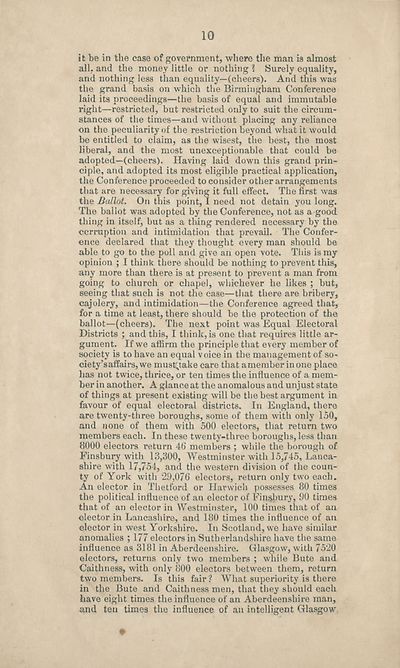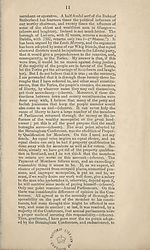Download files
Complete book:
Individual page:
Thumbnail gallery: Grid view | List view

10
it be in the case of government, where the man is almost
all, and the money little or nothing ? Surely equality,
and nothing less than equality—(cheers). And this was
the grand basis on which the Birmingham Conference
laid its proceedings—the basis of equal and immutable
right—restricted, but restricted only to suit the circum¬
stances of the times—and without placing any reliance
on the peculiarity of the restriction beyond what it would
be entitled to claim, as the wisest, the best, the most
liberal, and the most unexceptionable that could be
adopted—(cheers). Having laid down this grand prin¬
ciple, and adopted its most eligible practical application,
the Conference proceeded to consider other arrangements
that are necessary for giving it full effect. The first was
the Ballot. On this point, I need not detain you long.
The ballot was adopted by the Conference, not as a good
thing in itself, hut as a thing rendered necessary by the
corruption and intimidation that prevail. The Confer¬
ence declared that they thought every man should be
able to go to the poll and give an open vote. This is my
opinion ; I think there should be nothing to prevent this,
any more than there is at present to prevent a man from
going to church or chapel, whichever he likes ; but,
seeing that such is not the case—that there are bribery,
cajolery, and intimidation—the Conference agreed that,
for a time at least, there should be the protection of the
ballot—(cheers). The next point was Equal Electoral
Districts ; and this, I think, is one that requires little ar¬
gument. If we affirm the principle that every member of
society is to have an equal voice in the management of so-
ciety’saffairs, we must;take care that amemberinone place
has not twice, thrice, or ten times the influence of a mem¬
ber in another. A glance at the anomalous and unjust state
of things at present existing will be the best argument in
favour of equal electoral districts. In England, there
are twenty-three boroughs, some of them with only ISO,
and none of them with 500 electors, that return two
members each. In these twenty-three boroughs, less than
8000 electors return 46 members ; while the borough of
Finsbury with 13,300, Westminster with 15,745, Lanca¬
shire with 17,754, and the western division of the coun¬
ty of York with 29,076 electors, return only two each.
An elector in Thetford or Harwich possesses 80 times
the political influence of an elector of Finsbury, 90 times
that of an elector in Westminster, 100 times that of an
elector in Lancashire, and 180 times the influence of an
elector in west Yorkshire. In Scotland, we have similar
anomalies ; 177 electors in Sutherlandshire have the same
influence as 3181 in Aberdeenshire. Glasgow, with 7520
electors, returns only two members ; while Bute and
Caithness, with only 800 electors between them, return
two members. Is this fair ? What superiority is there
in the Bute and Caithness men, that they should each
have eight times the influence of an Aberdeenshire man,
and ten times the influence of an intelligent Glasgow
it be in the case of government, where the man is almost
all, and the money little or nothing ? Surely equality,
and nothing less than equality—(cheers). And this was
the grand basis on which the Birmingham Conference
laid its proceedings—the basis of equal and immutable
right—restricted, but restricted only to suit the circum¬
stances of the times—and without placing any reliance
on the peculiarity of the restriction beyond what it would
be entitled to claim, as the wisest, the best, the most
liberal, and the most unexceptionable that could be
adopted—(cheers). Having laid down this grand prin¬
ciple, and adopted its most eligible practical application,
the Conference proceeded to consider other arrangements
that are necessary for giving it full effect. The first was
the Ballot. On this point, I need not detain you long.
The ballot was adopted by the Conference, not as a good
thing in itself, hut as a thing rendered necessary by the
corruption and intimidation that prevail. The Confer¬
ence declared that they thought every man should be
able to go to the poll and give an open vote. This is my
opinion ; I think there should be nothing to prevent this,
any more than there is at present to prevent a man from
going to church or chapel, whichever he likes ; but,
seeing that such is not the case—that there are bribery,
cajolery, and intimidation—the Conference agreed that,
for a time at least, there should be the protection of the
ballot—(cheers). The next point was Equal Electoral
Districts ; and this, I think, is one that requires little ar¬
gument. If we affirm the principle that every member of
society is to have an equal voice in the management of so-
ciety’saffairs, we must;take care that amemberinone place
has not twice, thrice, or ten times the influence of a mem¬
ber in another. A glance at the anomalous and unjust state
of things at present existing will be the best argument in
favour of equal electoral districts. In England, there
are twenty-three boroughs, some of them with only ISO,
and none of them with 500 electors, that return two
members each. In these twenty-three boroughs, less than
8000 electors return 46 members ; while the borough of
Finsbury with 13,300, Westminster with 15,745, Lanca¬
shire with 17,754, and the western division of the coun¬
ty of York with 29,076 electors, return only two each.
An elector in Thetford or Harwich possesses 80 times
the political influence of an elector of Finsbury, 90 times
that of an elector in Westminster, 100 times that of an
elector in Lancashire, and 180 times the influence of an
elector in west Yorkshire. In Scotland, we have similar
anomalies ; 177 electors in Sutherlandshire have the same
influence as 3181 in Aberdeenshire. Glasgow, with 7520
electors, returns only two members ; while Bute and
Caithness, with only 800 electors between them, return
two members. Is this fair ? What superiority is there
in the Bute and Caithness men, that they should each
have eight times the influence of an Aberdeenshire man,
and ten times the influence of an intelligent Glasgow
Set display mode to:
![]() Universal Viewer |
Universal Viewer | ![]() Mirador |
Large image | Transcription
Mirador |
Large image | Transcription
| Antiquarian books of Scotland > Politics & government > Complete suffrage > (14) |
|---|
| Permanent URL | https://digital.nls.uk/125712295 |
|---|
| Description | Thousands of printed books from the Antiquarian Books of Scotland collection which dates from 1641 to the 1980s. The collection consists of 14,800 books which were published in Scotland or have a Scottish connection, e.g. through the author, printer or owner. Subjects covered include sport, education, diseases, adventure, occupations, Jacobites, politics and religion. Among the 29 languages represented are English, Gaelic, Italian, French, Russian and Swedish. |
|---|

